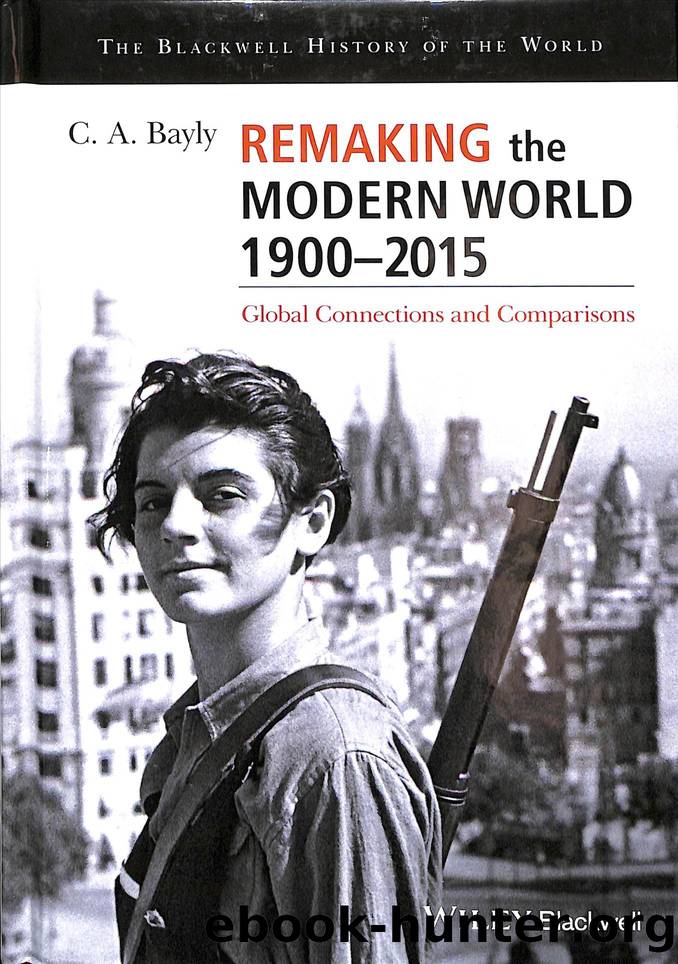Remaking the Modern World 1900-2015 by C. A. Bayly

Author:C. A. Bayly [Bayly, C. A.]
Language: eng
Format: epub
Tags: History, Politics, Culture and Society, A200, A326, A327
Publisher: John Wiley & Sons, Inc.
Published: 2018-09-17T00:00:00+00:00
Conclusion
Why did so many major social and political changes come about largely within this one decade? Clearly, the globalisation of capital following the Second World War played an important part. It enhanced the differences in income and life satisfaction between an affluent West and the rest of the world. Combined with an exponential growth in communications, regimes could no longer hive themselves off from developments elsewhere. South Africa could not both sustain economic relations with the rest of Africa, Europe and America and, at the same time, retain a system abhorrent to peoples and governments there. The Shah of Iran could not maintain his rule, quaffing Château Lafite Rothschild, when his people remained desperately poor, and Muslims across the world were beginning to see salvation in the politics of piety. Even European liberal and socialist parties could not remain immune to the collapse of Communism or the slow relative decline of personal incomes as the post-war boom ended in the 1970s.
Underlying all this was the diffusion of ideologies of popular liberation, whether Christian, Muslim or secular libertarian, which blended with indigenous concepts of the good life and personal self-respect. It is impossible either to deny the significance of the global spread of ideas, economic and political forms or, equally, to ignore the varied ways in which these developments were appropriated and âcannibalisedâ in different societies. In none of the examples treated in this chapter, though, did the outcome of movements for change see an easy or happy accomplishment of these aspirations to the good life. Ethnic conflict, religious and secular tyranny, widening disparities of wealth within regions and localised forms of state repression persisted. International capital had been globalised and had not only undermined socialism in the USSR but also, by the early 1990s, seen off trade union power over much of Europe and non-Communist Asia. Individualist consumerism had apparently trumped social radicalism. Yet, history, again in Gibbon's words, continued to be âphilosophy teaching by exampleâ and some at least of its lessons were progressive as democracy resumed its patchy growth. For this reason, it would be wrong to see the end of the century simply as a succession of political economic crises even though the next two decades did indeed spawn the terror of 9/11 and the recession of 2008.
Download
This site does not store any files on its server. We only index and link to content provided by other sites. Please contact the content providers to delete copyright contents if any and email us, we'll remove relevant links or contents immediately.
| Africa | Americas |
| Arctic & Antarctica | Asia |
| Australia & Oceania | Europe |
| Middle East | Russia |
| United States | World |
| Ancient Civilizations | Military |
| Historical Study & Educational Resources |
Magic and Divination in Early Islam by Emilie Savage-Smith;(1532)
Papillon by Henry Charrière(1421)
Bohemians, Bootleggers, Flappers, and Swells: The Best of Early Vanity Fair by Bohemians Bootleggers Flappers & Swells- The Best of Early Vanity Fair (epub)(1394)
Ambition and Desire: The Dangerous Life of Josephine Bonaparte by Kate Williams(1383)
Twelve Caesars by Mary Beard(1311)
Operation Vengeance: The Astonishing Aerial Ambush That Changed World War II by Dan Hampton(1155)
What Really Happened: The Death of Hitler by Robert J. Hutchinson(1154)
London in the Twentieth Century by Jerry White(1143)
The Japanese by Christopher Harding(1129)
Time of the Magicians by Wolfram Eilenberger(1125)
Twilight of the Gods by Ian W. Toll(1112)
Lenin: A Biography by Robert Service(1072)
The Devil You Know by Charles M. Blow(1023)
A Social History of the Media by Peter Burke & Peter Burke(968)
Freemasons for Dummies by Hodapp Christopher;(963)
Napolean Hill Collection by Napoleon Hill(936)
Henry III by David Carpenter;(919)
The Churchill Complex by Ian Buruma(906)
The Rise and Triumph of the Modern Self by Unknown(904)
